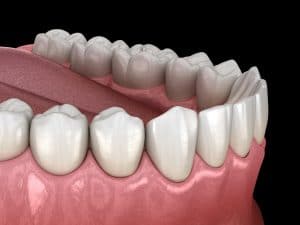 The periodontal (gum) tissue that surrounds and protects your dental ridges and teeth roots is more important than many people realize. For example, your gums help keep your teeth securely in place within your jawbone, and they help stop oral bacteria from affecting your teeth roots. When this tissue begins to recede from your teeth – a condition known as gum recession – it can often be a warning that you should visit your periodontist for expert care. At our Encinitas/San Diego periodontal office, we can pinpoint the specific cause behind your gum recession and recommend an appropriate treatment plan to stop it.
The periodontal (gum) tissue that surrounds and protects your dental ridges and teeth roots is more important than many people realize. For example, your gums help keep your teeth securely in place within your jawbone, and they help stop oral bacteria from affecting your teeth roots. When this tissue begins to recede from your teeth – a condition known as gum recession – it can often be a warning that you should visit your periodontist for expert care. At our Encinitas/San Diego periodontal office, we can pinpoint the specific cause behind your gum recession and recommend an appropriate treatment plan to stop it.
What does gum recession mean?
Your gums may begin to recede for a variety of reasons. One of the most common is gingivitis, which is an infection in your gums that leads to more extensive gum disease. The infection is caused by harmful oral bacteria and plaque, which can work their way underneath your gum line. When they settle there, the infection they cause can force your gums to pull away from your teeth roots. Other reasons for gum recession may include brushing your teeth and gums too harshly for too long, or a misalignment in your teeth that disrupts the alignment of your gum tissues.
Why are your gums receding?
Before recommending an appropriate treatment plan, we’ll first have to diagnose the specific cause behind your gum recession. For example, if you have gingivitis, then periodontal cleaning (or scaling and root planing) can remove the bacteria causing it and allow your gums to reattach your teeth. If you’re applying too much pressure during your daily oral hygiene routine, then we can offer tips to help you stop doing so and, if necessary, appropriate treatment to restore your healthy gums (such as a Pinhole gum graft).
How to stop gum recession
Once we’ve diagnosed the cause of your gum recession, then we can design an appropriate plan to treat it and, if necessary, a routine periodontal maintenance schedule to help prevent it in the future. For instance, if your gingivitis progresses to more severe gum disease, then your gums may still be compromised even after scaling and root planing. To keep it under control and stop your gums from becoming more compromised, you may need more involved specialized care, such as laser periodontal treatment.
Learn more about gum recession
When your gums start to recede, it may be a warning of periodontal disease, or it may heighten your risks of developing it. For more information, schedule a consultation with Dr. Kania by calling her periodontal office in Encinitas/San Diego, CA, at (760) 642-0711.



